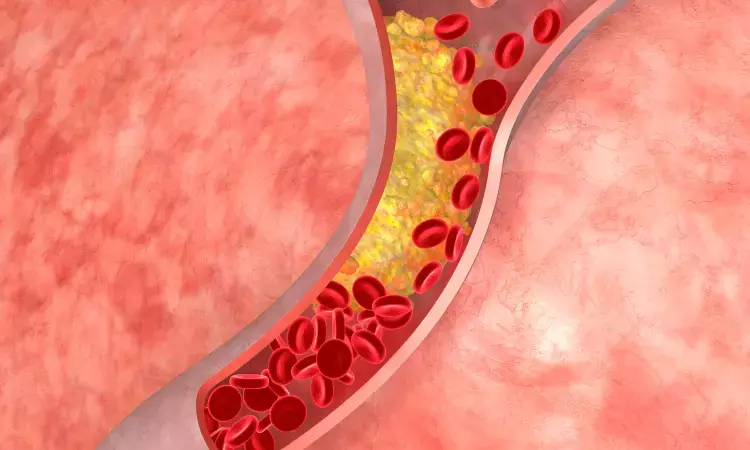- Home
- Medical news & Guidelines
- Anesthesiology
- Cardiology and CTVS
- Critical Care
- Dentistry
- Dermatology
- Diabetes and Endocrinology
- ENT
- Gastroenterology
- Medicine
- Nephrology
- Neurology
- Obstretics-Gynaecology
- Oncology
- Ophthalmology
- Orthopaedics
- Pediatrics-Neonatology
- Psychiatry
- Pulmonology
- Radiology
- Surgery
- Urology
- Laboratory Medicine
- Diet
- Nursing
- Paramedical
- Physiotherapy
- Health news
- Fact Check
- Bone Health Fact Check
- Brain Health Fact Check
- Cancer Related Fact Check
- Child Care Fact Check
- Dental and oral health fact check
- Diabetes and metabolic health fact check
- Diet and Nutrition Fact Check
- Eye and ENT Care Fact Check
- Fitness fact check
- Gut health fact check
- Heart health fact check
- Kidney health fact check
- Medical education fact check
- Men's health fact check
- Respiratory fact check
- Skin and hair care fact check
- Vaccine and Immunization fact check
- Women's health fact check
- AYUSH
- State News
- Andaman and Nicobar Islands
- Andhra Pradesh
- Arunachal Pradesh
- Assam
- Bihar
- Chandigarh
- Chattisgarh
- Dadra and Nagar Haveli
- Daman and Diu
- Delhi
- Goa
- Gujarat
- Haryana
- Himachal Pradesh
- Jammu & Kashmir
- Jharkhand
- Karnataka
- Kerala
- Ladakh
- Lakshadweep
- Madhya Pradesh
- Maharashtra
- Manipur
- Meghalaya
- Mizoram
- Nagaland
- Odisha
- Puducherry
- Punjab
- Rajasthan
- Sikkim
- Tamil Nadu
- Telangana
- Tripura
- Uttar Pradesh
- Uttrakhand
- West Bengal
- Medical Education
- Industry
Monocyte-to-HDL-Cholesterol ratio independently tied to all-cause and CV mortality in CAD

China: A study published in the Lipids in Health and Disease, BMC has concluded that the Elevated monocyte-to-high-density lipoprotein-cholesterol ratio (MHR) in the general population is independently related to all-cause and cardiovascular mortality.
Elevated MHR value is related to higher all-cause and cardiovascular mortality in coronary artery disease patients and other comorbidities. MHR could predict cardiovascular events in chronic kidney disease. However, there needs to be more data about the general population. There is a lack of data concerning MHR's prognostic value for long-term mortality in the general population.
This study investigated MHR association with all-cause and cardiovascular mortality in the United States adult population.
Considering this, a study was conducted to investigate,
Based on data from NHANES 1999-2014 for the adult US population, What is the clinical significance of MHR in predicting all-cause and cardiovascular mortality?
The lead researcher was Dr Ming Jiang from the Department of Cardiology, the First Affiliated Hospital of Nanjing Medical University, Nanjing, China.
The study methods and results could be summarised as follows:
- The study included 34,335 participants aged≥20 years.
- Kaplan-Meier plots, long-rank tests, multivariate Cox regression and restricted cubic spline analysis, were used in the study.
- The average follow-up duration was of 93.5 ± 56 months.
- Four thousand three hundred ten participants constituting 12.6%, died.
- Seven hundred fifty-four participants constituting 2.2% of deaths, were attributed to cardiovascular diseases.
- There were statistically significant differences in all-cause and cardiovascular mortality among the MHR tertiles (log-rank test: all P < 0.001).
- The participants in the highest tertile of MHR had an increased risk of all-cause and cardiovascular mortality with a hazard ratio of 1.19 and 1.44, respectively, compared to the lowest tertile.
- MHR had a non-linear association with all-cause mortality, which was significant, and the inflection point was 0.006.
- Each 2-fold change in MHR was related to a 32% decrease and a 20% increase with HR of 0.68 and 1.20, respectively, in the risk of all-cause mortality on the left and right flanks of the inflection point respectively.
- Every 2-fold change in MHR was associated with increased cardiovascular mortality by 21 % with an HR of 1.21.
The study has suggested that MHR is a promising predictor for identifying individuals with a higher risk of poor clinical outcomes.
The researchers also mentioned that MHR is inexpensively acquired. Hence, it is a convenient clinical tool for risk stratification. It also guides the strategies for both preventative and treatment for clinicians, which could be applied in routine clinical care.
Further reading:
Jiang M, Yang J, Zou H, Li M, Sun W, Kong X. Monocyte-to-high-density lipoprotein-cholesterol ratio (MHR) and the risk of all-cause and cardiovascular mortality: a nationwide cohort study in the United States. Lipids Health Dis. 2022 Mar 18;21(1):30. DOI: 10.1186/s12944-022-01638-6. PMID: 35300686; PMCID: PMC8931976.
BDS, MDS in Periodontics and Implantology
Dr. Aditi Yadav is a BDS, MDS in Periodontics and Implantology. She has a clinical experience of 5 years as a laser dental surgeon. She also has a Diploma in clinical research and pharmacovigilance and is a Certified data scientist. She is currently working as a content developer in e-health services. Dr. Yadav has a keen interest in Medical Journalism and is actively involved in Medical Research writing.
Dr Kamal Kant Kohli-MBBS, DTCD- a chest specialist with more than 30 years of practice and a flair for writing clinical articles, Dr Kamal Kant Kohli joined Medical Dialogues as a Chief Editor of Medical News. Besides writing articles, as an editor, he proofreads and verifies all the medical content published on Medical Dialogues including those coming from journals, studies,medical conferences,guidelines etc. Email: drkohli@medicaldialogues.in. Contact no. 011-43720751


